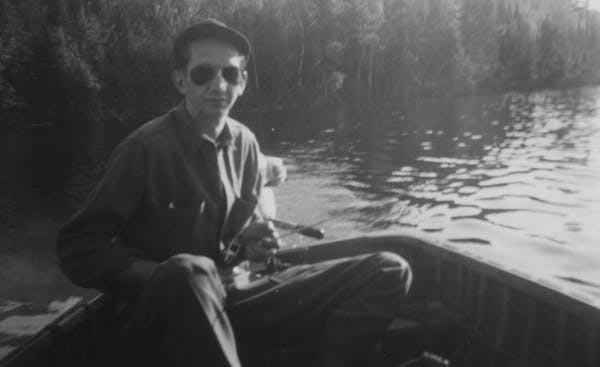CROSSLAKE, MINN. – In a few weeks this small lakes-country resort town will unveil a fundraising effort whose one-year goal is to raise $6 million, a pie-in-the-sky target for most communities of 2,200 residents.
If successful, the effort won't result in the purchase of a shiny red fire truck or the opening of a new school (Crosslake already has both), but instead the construction of a 15,000-square-foot building whose long-term intent is to help Minnesotans conserve their uncommonly iconic state bird, the common loon.
And to encourage the same state residents to restore and sustain the clean waters they and loons alike require for long-term survival.
The sizable Crosslake money-raising endeavor will not be aided by the $7.2 million that Minnesota will receive for loon conservation from the 2010 Deepwater Horizon Gulf of Mexico oil spill, as previously believed.
Use of that money, per U.S. Fish and Wildlife Service guidelines, will be limited to loon habitat development and related work, said Carrol Henderson, the recently retired state Department of Natural Resources nongame wildlife program leader — not to the types of educational programs that will be the centerpiece of Crosslake's proposed National Loon Center.
A loon expert, Henderson was the driving force during the latter part of his 40-year DNR career to secure the Deepwater funds. Only about 900 loons were killed directly by the oil spill. But research showed that perhaps many of the approximately 12,000 Minnesota loons that migrate south in fall were contaminated by the oil and the chemicals used to clean it up.
Still more money from the Deepwater spill might be awarded in the future to help Minnesota loons, Henderson said. If so, like the initial $7.2 million allotment, the funds will be used to promote the use of nontoxic fishing tackle and to underwrite lake associations' and other loon-conservation efforts.
Organizers of the proposed National Loon Center scored a coup last year when Henderson agreed to join its board. Few DNR employees, past or present, enjoy the credibility Henderson does among state and national conservationists.
"The (proposed) Loon Center has a lot of great people associated with it and some experts in fundraising," Henderson said. "As a biologist, I'll be able to help on the conservation side. In the long term, the center will be an excellent partner with the DNR and its loon conservation efforts."
In a joint interview this week, National Loon Center Foundation President Jim Anderson and Vice President Leah Heggerston, both of Crosslake, said the idea for the loon center was first proffered about four years ago by a Catholic priest, the Rev. Ryan Moravitz.
"Father Ryan had come from Ely, where the International Wolf Center is, and he thought Crosslake would be ideal for a similar center for loons," Anderson said.
The idea gained energy in 2016 when the Minnesota Design Team, an affiliate of the American Institute of Architects Minnesota, visited Crosslake to suggest ways the town could improve. The all-volunteer design team, which has helped more than 130 rural Minnesota communities leverage their geographical and other assets, supported the loon center as a natural fit for Crosslake.
Following up, the University of Minnesota Extension's Regional Sustainable Development Partnership created a feasibility study of the loon center proposal and, ultimately, a master plan for its construction and operation.
The plan calls for the center and its multiple conservation exhibits to be built on federally owned property adjacent to the Cross Lake Recreation Area, a popular campground (150,000 visitors per year) on the shores of Cross Lake located within Crosslake city limits and operated by the U.S. Army Corps of Engineers.
Shoreline near the center would be restored and a boat, or "floating classroom," as Anderson describes it, would be bought to ferry center visitors onto Cross Lake to see conservation projects firsthand.
To kick-start the effort, Heggerston, Anderson and other National Loon Center supporters last year applied to the Legislative-Citizen Commission on Minnesota Resources for $4 million in state lottery funds. The advisory panel approved the idea, as did the Legislature in its recent session, with the proviso that $2.5 million of the $4 million be held back until the additional $6 million needed for the project is raised privately.
A 25-year lease has been issued by the Corps of Engineers for the National Loon Center site, clearing the way for the fundraising campaign.
"A Twin Cities firm, Adventure Creative, is developing our capital campaign, which we will officially launch, along with our new website, July 20," Heggerston said. "They're exploring the idea of naming rights for the center and for its various exhibits. We are optimistic that individual Minnesotans, family and other foundations, and many of the state's corporations, large and small, will want to join the effort to conserve loons and the clean water they depend on."
Proposed opening of the National Loon Center is 2022.
Dennis Anderson • 612-673-4424

Anderson: Celebrate Earth Day by rekindling real connection to nature
Anderson: Anglers protesting tough new Mille Lacs rules are wrong

Anderson: Courts, not politicians, should rule on Red Lake, White Earth lands

Anderson: Multimillion windfall gets invasive carp deterrent moving
![A young whitetail deer searches for food as another blanket of snow coats the arrowhead. ] Minnesota -State of Wonders, Arrowhead in Winter BRIAN PETE](https://arc.stimg.co/startribunemedia/WK32UWWY6FKNWJUIYCJ6ZPT4AU.jpg?h=91&w=145&fit=crop&bg=999&crop=faces)

